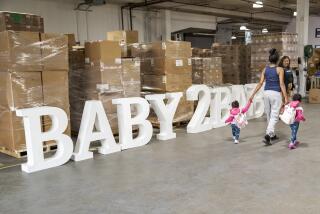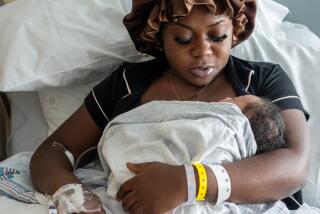Help Pours In for Parents of Octuplets
- Share via
HOUSTON — Long before she gave birth to the world’s only surviving octuplets, Nkem Chukwu surely knew the adage, “It takes a village to raise a child.” A classic saying in her native Nigeria, the expression accurately describes her childhood in a family compound where a host of relatives raised Chukwu and her siblings, a relative says.
From thousands of miles away this week, both the U.S community at large and Nigeria’s highly organized emigre network are offering the family another kind of help.
Chukwu, 27, is recuperating at St. Luke’s Episcopal Hospital, while her eight babies remain in critical but stable condition. Soon after she gave birth, hospital administrators set up a command center staffed by 20 people to handle an onslaught of calls and offers of help.
Among the donations so far: a lifetime supply of diapers from an anonymous donor, a lifetime supply of baby wipes from a company that manufactures them, a lifetime supply of disposable training pants, a year’s supply of food from a local grocery store, a year’s supply of formula and a shipment of early childhood educational supplies.
Meanwhile, Houston’s vibrant Nigerian community, estimated at 50,000 people, has set its own assistance mechanisms in motion. Houston’s USAfrica newspaper has launched the most-ambitious fund, the USAfrica Children’s Support Network.
While making a special call to the nation’s African and African American citizens, editor Chido Nwangu urged participation from “everyone who wishes those kids well.” Chaired by Houston church and medical leaders, the fund is designed not only to raise cash, but to develop a psychological support network for the family, including volunteer child care. Grass-roots immigrant groups are also starting fund-raising.
“Our family is very excited and grateful to God,” the father, Iyke Louis Udobi, 41, said Tuesday in the family’s first public statement, which was released through the hospital. “We are very appreciative of the worldwide support over the past few days, particularly the prayers and spiritual connection at this special time of the year.”
The babies, who have yet to be named, were in critical condition at Texas Children’s Hospital, part of the Houston ‘s Medical Center complex. Dr. Leonard Weisman said one of the babies had a minor heart anomaly that can be repaired.
The first baby was born Dec. 8, 15 weeks premature. Her two brothers and five sisters who followed by caesarean section Sunday were born 13 weeks early. The smallest was a girl weighing 10.3 ounces.
Largely comprising professionals who sought higher education here in the late 1970s, Houston’s Nigerians belong to an array of mutual assistance clubs that often raise money for community members in need.
Based on tribal affiliation, ancestral villages, gender, age group, or elder status, such groups can raise thousands of dollars and plan to start fund-raising for the family, said Dr. N’ekwunife Muoneke, a mathematics professor who belongs to the same Igbo ethnic group as the family.
“Fund-raising is going to be started by a group the mother belongs to, or a group from her town, or her local [tribal] government,” he said. Not only club members, but all members of the larger tribal group are expected to pitch in, he added.
Among the Igbo, births are cause for lavish celebration. “There’s usually a lot of drinking and partying and ceremonies” that go with these observances, Muoneke said. In some Igbo groups, infants are presented to the world by raising them up to the sky; in others, a bit of vegetable oil is dropped into the infant’s mouth, “to remind him of the world he’s come into.”
While community members say they expect numerous festivities to help the octuplets’ parents, they also noted that the couple have kept a low profile in the community. The father is a respiratory therapist and part-time real estate agent while Chukwu has been studying computer science
Nevertheless, community leaders who have had contact with them said the pair, who have not been available for interviews, are perceived as being highly traditional.
“They speak Igbo at home, and have their mother here,” said Muoneke, who has run into the couple at Nigerian social events. Nigerians, including himself, often bring their mothers to live with them in the United States in order to pass on cultural education to American-born grandchildren he said.
Houstonian Stephen Chukwu, a relative of Nkem, said she had had a traditional upbringing before coming to the United States about five years ago. “She came from a very large family . . . used to having a lot of brothers, sisters, uncles and cousins around, in a very big compound,” he said.
Abel Udeh, another relative in Houston, added: “They will be raised as Americans, but they will learn the customs and traditions of Nigeria. I don’t know how they will manage, but everyone wants to help. In Nigeria, we believe in an extended family. We have many extended family members in Africa but many in America too.”
Past parents of multiple birth have experienced distinctly varied public responses. Bobbi and Kenny McCaughey of Carlisle, Iowa, were deluged with donations after their septuplets were born last year.
But in Washington, Jacqueline and Lindon Thompson were virtually ignored for six months after the May 1997 births of their sextuplets. A newspaper story contrasting the experience of the black family to the McCaugheys prompted a stream of donations, including a six-bedroom house, a van and free day care.
Chukwu is expected to be released from the hospital in about a week, while her children are likely to remain hospitalized for up to three months. The cost of medical care has been estimated at $250,000 per child.
Times researcher Lianne Hart contributed to this story.
More to Read
Sign up for Essential California
The most important California stories and recommendations in your inbox every morning.
You may occasionally receive promotional content from the Los Angeles Times.













